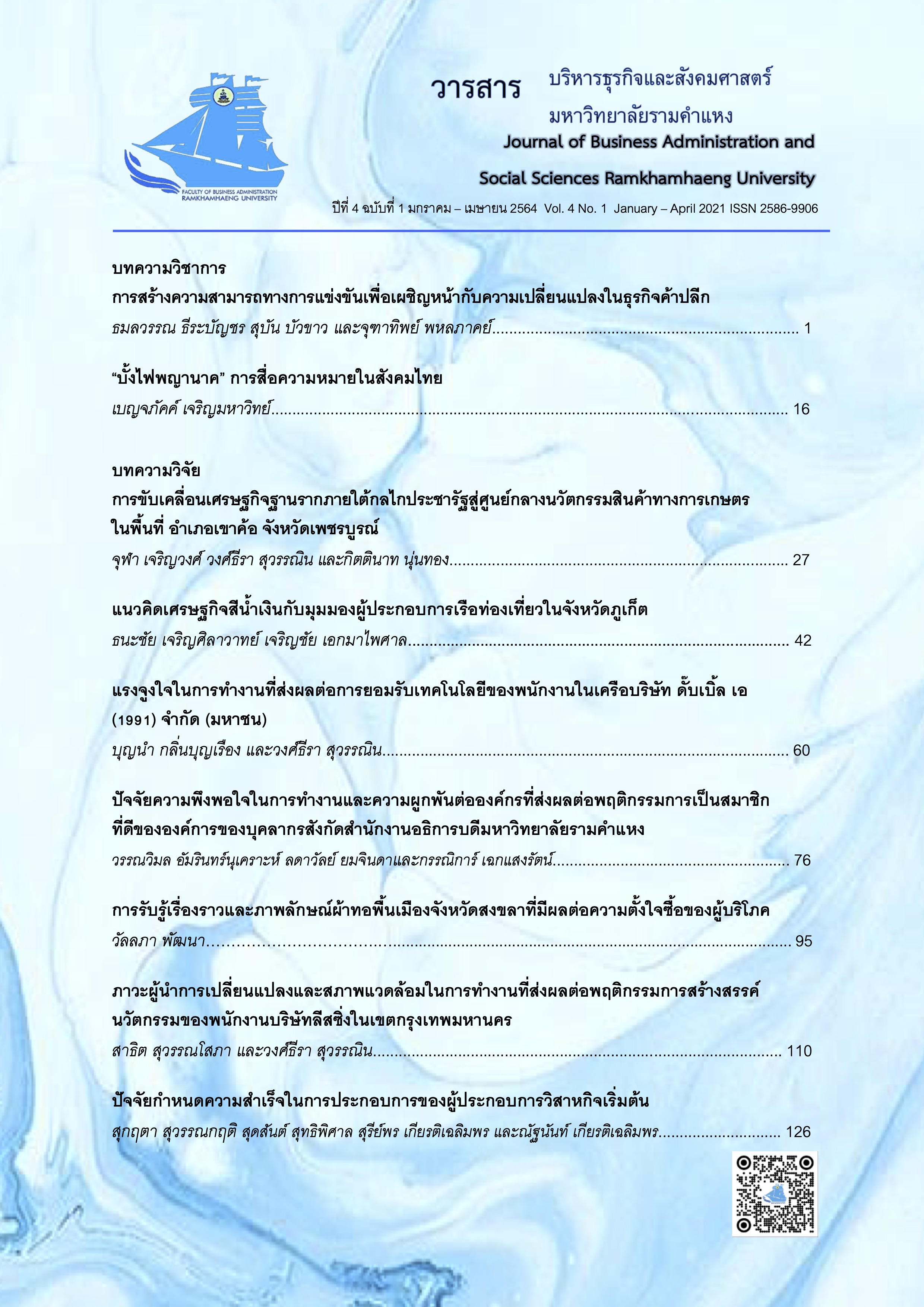Local Economy Driving Under Civil State Mechanisms Towards the Agricultural Produce Innovation Center in Khao Kho District, Phetchabun Province
Main Article Content
Abstract
In this research investigation, the researchers survey 1) the potential of the local economy in Khao Kho district, Phetchabun province; study 2) the local economy driving process through the survey and analysis under civil state mechanisms; experiment 3) with the results of the local economy driving guidelines using civil state mechanisms; and draft 4) a local economy development plan under civil state mechanisms. Ninety members of the target population who were selected using the technique of purposive sampling consisted of fifty from the civil sector, ten from the government sector, ten from the private sector, ten from the education sector, and ten from the local sector. The research instrument was a semi-structured interview form. Data were inductively analyzed and presented in a descriptive form. Findings are as follows:
1. The local economy potential of the area consisted of the following. 1) Geography and climate facilitate agricultural produce cultivation. 2) Human resources are found to indicate that local people had experience and expertise in specialized agriculture.
2. Local people were aware of the importance of civil state mechanisms in economy driving. They integrated their work from all sectors in the area. Each sector played their respective roles fully leading to the driving in a more concrete manner.
3. Each sector had an opportunity to have conversations and to exchange ideas in ways never used before. This resulted in the operations of Pracharat Market Project being rather highly successful. It could expand the success in the aspect of continuity and foster motivation for other areas to follow suit.
4. The draft of the local economy development plan is divided into four categories. 1) The general category is on the authority and duties one should perform with one another. 2) The plan intent is to ensure that the quality of life of all the people must be better. 3) The plan management committee consists of 25 members, five from each sector as selected by each sector. 4) All projects in the area must be driven under civil state mechanisms.
Article Details
เนื้อหาและข้อมูลในบทความที่ลงตีพิมพ์ในวารสารบริหารธุรกิจและสังคมศาสตร์ มหาวิทยาลัยรามคำแหง ถือเป็นข้อคิดเห็นและความรับผิดชอบของผู้เขียนบทความโดยตรง ซึ่งกองบรรณาธิการไม่จำเป็นต้องเห็นด้วย หรือร่วมรับผิดชอบใดๆ
บทความ ข้อมูล เนื้อหา รูปภาพ ฯลฯ ที่ได้รับการตีพิมพ์ในวารสารบริหารธุรกิจและสังคมศาสตร์ มหาวิทยาลัยรามคำแหง ถือเป็นลิขสิทธิ์ของวารสารบริหารธุรกิจและสังคมศาสตร์ มหาวิทยาลัยรามคำแหง หากบุคคลหรือหน่วยงานใดต้องการนำบทความทั้งหมดหรือส่วนหนึ่งส่วนใดไปเผยแพร่ต่อ หรือเพื่อกระทำการใดๆ จะต้องได้รับอนุญาตเป็นลายลักษณ์อักษรจากวารสารบริหารธุรกิจและสังคมศาสตร์ มหาวิทยาลัยรามคำแหง ก่อนเท่านั้น
References
ญาติมา นุชแดง. (2562). การพัฒนาประเทศไทยตามนโยบายประชารัฐกับการมีส่วนร่วมของประชาชนใน
จังหวัดฉะเชิงเทรา. วารสารชุมชนวิจัย, 13(1), 10–25.
ฐานิกา จันทร์เทพ. (2559). การศึกษาผลการดำเนินงานของคณะทำงานการพัฒนาเศรษฐกิจฐานรากและ ประชารัฐ. ปริญญานิพนธ์รัฐศาสตร์มหาบัณฑิตสาขาบริหารรัฐกิจและกิจการสาธารณะ สำหรับ นักบริหาร, คณะรัฐศาสตร์ มหาวิทยาลัยธรรมศาสตร์.
ทศพร ศิริสัมพันธ์. (2558). ความรู้เบื้องต้นเกี่ยวกับการบริหารราชการแนวใหม่. กรุงเทพฯ: สำนักงาน
คณะกรรมการพัฒนาระบบราชการ.
นารี วงศ์เลิศคุณากร. (2561). ปัจจัยที่ส่งผลต่อการพัฒนาทรัพยากรมนุษย์ของพนักงานภาคธุรกิจเอกชนใน
ยุคโลกาภิวัตน์. เศรษฐศาสตร์และบริหารธุรกิจปริทัศน์, 14(2), 170–187.
บุญทัน ดอกไธสง. (2561). ขอบข่ายรัฐประศาสนศาสตร์ยุคโลกาภิวัตน์. กรุงเทพฯ: ปัญญาชน.
ประเวศ วะสี. (2549). การพัฒนาพลังสร้างสรรค์ขององค์กร. กรุงเทพฯ: หมอชาวบ้าน.
ปัณณพงศ์ วงศ์ณาศรี. (2559). ทุนทางสังคมกับข้อเสนอเชิงนโยบายของการบูรณาการทุนทางสังคม
เพื่อการพัฒนาท้องถิ่น. วารสารอาศรัมวัฒนธรรมวลัยลักษณ์, 2(6), 50-76.
ศิริววรรณ เสรีรัตน์และคณะ. (2548). กลยุทธ์การตลาด การบริหารการตลาด และกรณีศึกษา. กรุงเทพฯ:
ธีระฟิล์มและไซเท็กซ์.
เสรี พงศ์พิศ. (2548). เศรษฐกิจพอเพียงการพัฒนายั่งยืน. กรุงเทพฯ: พิมพ์ลักษณ์.
อภิชัย พันธเสน. (2554). โครงการสังเคราะห์งานวิจัย ข้อเขียน และบทความเกี่ยวกับเศรษฐกิจพอเพียง.
รายงานการวิจัยฉบับสมบูรณ์. กรุงเทพฯ:
อภิชาติ โตดิลกเวชช์. (2560). แนวคิดเศรษฐกิจฐานรากกับประชารัฐ. กรุงเทพฯ: กรมพัฒนาชุมชน.
อรพิน สบโชคชัย. (2558). ประชารัฐ. กรุงเทพฯ: จุฬาลงกรณ์มหาวิทยาลัย.
อริสรา ป้องกัน. (2559). การบริหารจัดการที่ดีในการจัดบริการสาธารณะขององค์การบริหารส่วนตําบลเขต
พื้นที่ภาคเหนือตอนบน. วารสารวิชาการมหาวิทยาลัยอีสเทิร์นเอเชีย ฉบับมนุษยศาสตร์และ
สังคมศาสตร์, 6(2), 314-325.
Arnstein, S. R. (1969). A ladder of citizen participation. Jounal of American Institute of Planners,
(4), 216-224.
Cohen, J. M., & Uphoff, N. T. (1980). Participation Place in Rural Developmentt: Seeking Clarity
through Specificity, World Development. New York: Cornell University.
Creighton, J. L. (2005). The Public Participation Handbook: Making Better Decisions through
Citizen Involvement. San Francisco: Jossey Bass.
Griffin, R. W. (1997). Management (5th ed.). Houghton: Miffin.
Gilley, J. W., Eggland, S. A., & Maycunich, A. (2002). Principles of Human Resource Devilopment.
(2nd ed.). Reading, MA: Perseus.
Hoefman, K., Bramson, A., Schoors, K., & Ryckebusch, J. (2018). The impact of functional and
social value on the price of goods. PLoS ONE, 13(11), 1–12.
Tester, K. (2014). Civil Society. London: Routledge Taylor & Francis Group.
Smith, M. (2017). A Civil Society: Collective Actors in Canadian Political Life. University of
Toronto Press.


